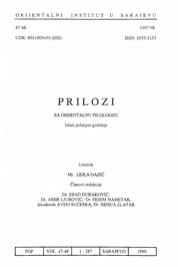HRIŠĆANSKO ZADUZBINARSTVO U PERIODU OSMANSKE UPRAVE
ENDOWMENTS DURING THE OTTOMAN RULE
Author(s): Olga ZirojevićSubject(s): Christian Theology and Religion, Civil Law, Islam studies, The Ottoman Empire, Sociology of Religion, Sharia Law
Published by: Orijentalni Institut u Sarajevu
Keywords: The Ottoman Rule; Islamic law; Waqfs; Zimiye; Kanun; Urf ; Adet; Millet System;
Summary/Abstract: Islamic law, with certain limitations, allows Jews and Christians to found endowments (waqfs) under the rules of their religions and before their religious representatives. In the relations between the Ottomans and non-Muslims (the so-called zimiye or wards) Shari’a was the main but not sole legal source: there was also Kanun (provisions with force of law), Urf ( settled practice of the supreme administration) and Adet (common law in the broadest sense of the word). Finally, religious issues were also adjusted to the State interests (the so-called Millet System). As for the categories of ownership over land, a customary classification was miri, mulk and waqf (endowment) lands, which also related to the monastic land. But, this land was mostly included in the State ownership (miri), with only its smaller part as full ownership (mulk) to be disposed of freely, i.e. it had a status of waqf and was extra commercium.
Journal: Prilozi za orijentalnu filologiju
- Issue Year: 1997
- Issue No: 46
- Page Range: 131-139
- Page Count: 9
- Language: Serbian

